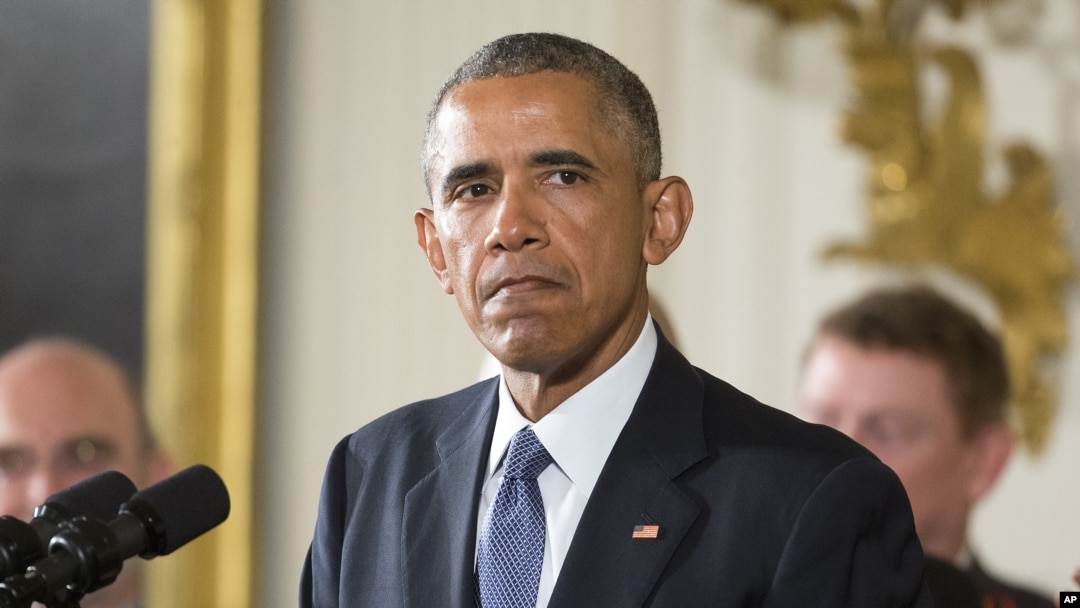With his calls this week for tighter gun laws in the U.S., President Barack Obama brought gun control to the forefront of America's 2016 presidential election campaign — and made headlines across the globe.
Obama announced plans to tighten and clarify rules about who can sell guns to whom, whether in shops, gun shows or online.
But Obama's tears as he recalled victims of gun attacks received as much attention as the proposals themselves.
"Obama's tears were every bit as memorable as his words," wrote Khaled A. Beydoun for Al Jazeera English. "In the U.S., guns are far more than weapons. They are ideological talismans."
Nick Curtis of New Zealand's Herald Online notes with irony that when Hillary Clinton and Margaret Thatcher wept in public, their critics dismissed them as “weak.”
“The publicly weeping female is seen as irrational, out of control, dangerous. By contrast, a bloke who blubs in public is today thought brave, noble, in touch with his feelings," he said.
"Barack Obama's tears for America's murdered children as he called for more gun control have been claimed by supporters as a sign of his deep emotional response to a national tragedy, and by Republican foes as an act of 'fascist' fakery involving the deployment of an onion, or some other lachrymal enhancement."
Britain's Telegraph ran a poll asking readers whether the presidential tears were real or fake.
Meanwhile, a number of tweeps from the Middle East have questioned why the U.S. leader wasn't weeping for those killed in conflicts abroad.
Obama gun action: too little too late?
Across traditional and social media, observers questioned why the U.S. President waited so long - his eighth and last year in the White House -- to tackle the issue of gun violence in America.
"By his own estimate, in the seven years Barack Obama has been in the White House more than 200,000 American men, women and children have died in his country’s epidemic of gun violence. In the final months of his presidency, Mr Obama’s response, long overdue, is to use his executive powers to order a series of modest gun control measures," reads a Jan. 7 editorial in the Australian.
"His presidential orders tinker at the edges of existing lax controls...the measures fail to address the huge number of weapons already in private hands."
Assessing blame
And some analysts blame not the politicians, but the U.S. public itself, for the rising number of violent deaths in America.
“The number of people who are shot in the U.S. - a figure that is more appropriate in a country involved in a civil war than an allegedly civilized western industrialized nation - will not considerably decline as a result of these executive orders," reads a recent editorial in Germany's Sueddeutsche newspaper.
"When the issue is U.S. gun madness, we can always point to die-hard Republicans, conservative constitutional judges and nasty gun lobbyists..They all have...blood on their hands. But, fundamentally, this is a social, not a political or legal problem. The majority of Americans do not want to touch the right to carry a gun, and they do not care about the victims.”
India's Urdu-language daily Hindustan Express asks why the U.S. has no official figures on the actual number of guns circulating in the nation:
"The United States is an extremely organized country and the intelligence agencies and all the institutions ensuring enforcement of law and order are quite organized," it notes.
Losing battle?
Many international editorials stress the strong Republican opposition to gun control in America and express doubt that real reform will take place.
"It would be too upbeat to call a televised town hall meeting on Thursday night between President Barack Obama and gun-rights advocates a dialogue of the deaf," Britain's Economist newspaper noted Friday.
"The difference between opponents and supporters is that the latter believe Mr Obama when he says he has no plan, ability or time left in office to reduce America’s uniquely large private arsenal. And judging by the weary, almost despairing expression on Mr Obama’s face during his CNN town hall meeting, the supporters are right," the Economist concluded.
US reaction ranges from cynicism to gratitude
It's no surprise, given the polarization around the issue in the U.S., that reaction here was strong on both sides of the debate.
The National Rifle Association - which was called out by Obama during the townhall for declining an invitation to participate - liveblogged the event, and took their own jabs at the President, calling the gun control effort "a distraction" and a "PR stunt."
The conservative Washington Times opined that, since the president can't figure out how to confiscate the guns Americans already own, "he has set out to make life as miserable as he can for everyone who wants to exercise his constitutional right to own a gun, a right fundamental to the republic for as long as there has been an America."
Former U.S. Rep. Gabrielle Giffords, who five years ago survived a mass shooting at an event in her Arizona Congressional district and now advocates for stricter gun regulation, thanked President Obama for taking action.
The New York Times editorial board used what they called the President's "televised defense of his own modest gun proposals" to take Republicans to task for peddling "hallucinatory fictions" about Obama confiscating guns – which in turn, according to the Times, has helped boost gun sales and drive up stock prices of gun manufacturers.


